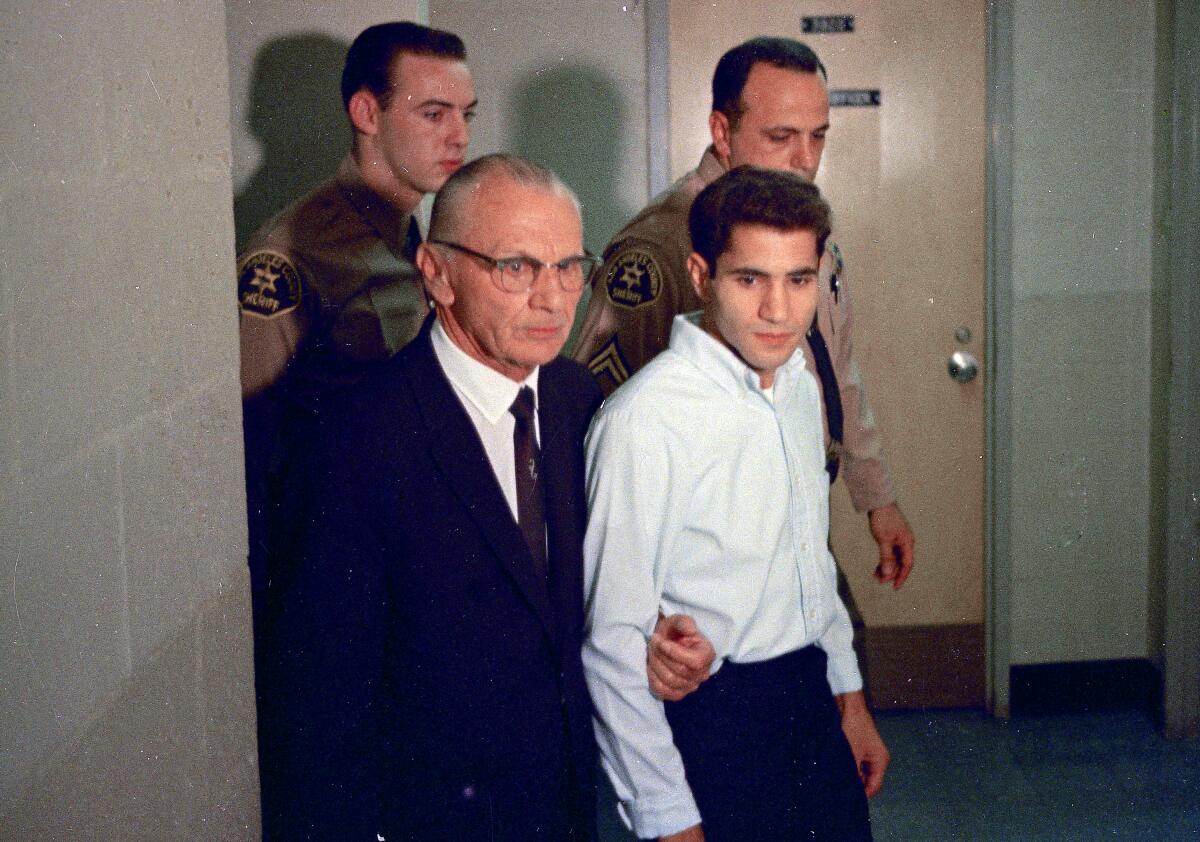Who is Sirhan Sirhan? His life before the RFK assassination

- Share via
Good morning, and welcome to the Essential California newsletter. It’s Monday, August 30. I’m Justin Ray.
On Friday, the world learned that the man who gunned down Sen. Robert F. Kennedy might get released, sparking uproar and confusion.
The news was surprising to me for three reasons: (1) There was a lot of evidence he did the crime. Back in 1968, a 24-year-old Sirhan Sirhan was captured at the scene with a .22-caliber handgun in his hand. Three weeks before the shooting, he wrote a manifesto calling for Kennedy’s death. (2) He had also previously been denied parole 15 times. (3) And I’ll even say it: The victim wasn’t just some person on the street; he assassinated a Kennedy. It felt like in terms of uphill battles, this was Mt. Everest covered in oil.
Yet here we are, with Sirhan, now 77, recommended for parole after serving more than 50 years in prison. It doesn’t guarantee he will be released, but it is a big step in his quest for freedom. The Times has reported on how the case has split the Kennedy family, a curious detail in an autopsy report about the position of the gunshot wound that has fueled conspiracy theories, and background on Sirhan’s legal battle for freedom. But we haven’t talked about Sirhan’s life.
In my quest to understand Sirhan, I have read magazine articles, a book by investigative journalist Dan E. Moldea, and listened to a podcast series. Here is a condensed overview of his early years, including an incident that appears to have changed his personality.
Sirhan’s early years
Sirhan Bishara Sirhan was born March 19, 1944 in Jerusalem, Palestine. As a child, it’s likely he witnessed violence from the Arab–Israeli conflict. “There was probably a tremendous amount of trauma when Sirhan was small. There were villages being wiped out,” Moldea’s book quotes Sergeant Mike Nielsen as saying.
In 1956, the Sirhan family applied and qualified for U.S. visas as Palestinian refugees. They eventually moved to Pasadena. His father — described as a “strict disciplinarian, who beat young Sirhan” — didn’t adapt to life in America and eventually abandoned his family. A high school teacher described Sirhan as having a “language handicap,” but said that he was “cooperative [and] well-mannered.”
After graduating, he enrolled in Pasadena City College in fall of 1963, but he had poor attendance. The next year, he began coming home immediately after classes to care for his sister, Aida, who had leukemia. She died in March 1965 at the age of 29. Three months later, he dropped out of college.
During the fall of 1965, Sirhan started working at Santa Anita racetrack. While there, he trained to be a jockey. The book says a foreman at the ranch told the LAPD, “Sirhan was a poor horse rider and was constantly being thrown or falling from horses that he was working.” He quit in March 1966. Months later, he began working for Granja Vista del Rio Thoroughbred Horse Farm, near Corona. It was here that an incident would change his life.
On a foggy morning on Sept. 25, 1966, Sirhan fell from a mare named Hy-Vera, according to an article by Playboy. “Sirhan was thrown against a metal post, where he lay crumpled, crying and bleeding,” wrote James McKinley. Sirhan later received a $2,000 settlement over the incident.
The accident had lasting health effects on Sirhan. In a podcast series created by the writers behind the popular HBO series “The Jinx,” Sirhan Sirhan’s younger brother discussed how his personality changed: “He wanted to be by himself. It’s kind of hard to put into words. He didn’t want to be bothered. He was a little more irritable,” Munir Sirhan said (On a side note, I’ve noticed that many notorious killers experienced brain injuries during their childhoods, including California’s Richard Ramirez and Glen Edward Rogers).
Two years later, Sirhan would carry out the assassination, and RFK would become the third Kennedy son to die violently. Sirhan told The Times in 1985: “I originally had admired Sen. Kennedy. He was for the poor and downtrodden. He seemed to be for justice. But then he did things to support Israel, including backing the sending of 50 Phantom jets to Israel that I knew would be used to attack my people. It enraged me, I admit that.”
When it comes to his potential release, parole staff still have 90 days to review Sirhan’s case. After that, Gov. Gavin Newsom — or whoever might replace him following next month’s recall election — could still decide to block Sirhan’s release.
Although he has admitted to the crime in the past, Sirhan didn’t fully accept responsibility when expressing remorse at the Friday hearing.
“Sen. Kennedy was the hope of the world and I injured, and I harmed all of them and it pains me to experience that, the knowledge for such a horrible deed, if I did in fact do that,” Sirhan said. “I’m still responsible for being there and probably causing this whole incident, through my own gun or other guns.”
And now, here’s what’s happening across California:
Note: Some of the sites we link to may limit the number of stories you can access without subscribing.
What we know about the five California service members killed in Kabul airport blast. Hunter Lopez, 22, of Coachella Valley was the son of two Riverside County sheriff’s deputies. Kareem Nikoui, of Norco, graduated from Norco High School in 2019 and served in the Junior ROTC. Dylan R. Merola, of Rancho Cucamonga, planned to go to college and study engineering when he returned to the U.S. Nicole Gee, of Sacramento, was a maintenance technician with the 24th Marine Expeditionary Unit from Camp Lejeune in North Carolina. Darin Taylor Hoover, of Aliso Viejo, had been in the Marines for 11 years and was remembered as a hero who died serving others. Los Angeles Times
L.A. STORIES
The best breakfast burritos in Los Angeles. The origins of burritos, meals wrapped in flour tortillas for breakfast or otherwise, trace most credibly to Sonora, the northwestern state of Mexico where wheat has been cultivated since the 1500s. The Californian-Mexican connections made the burrito’s eventual presence in L.A. all but a foregone conclusion. The Times made a list of the best breakfast burrito spots the city has to offer. Los Angeles Times
Our daily news podcast
If you’re a fan of this newsletter, you’ll probably love our new daily podcast, “The Times,” hosted by columnist Gustavo Arellano, along with reporters from across our newsroom. Every weekday, it takes you beyond the headlines. Subscribe on Apple Podcasts and follow on Spotify.
POLITICS AND GOVERNMENT
Former California Gov. Gray Davis shares his perspective on the recall. Davis, the only governor in California’s history to be recalled and removed from office, shared his unique perspective of this year’s recall election in an interview from his home in Los Angeles. “There’s an old saying in politics, ‘you can’t beat somebody with nobody.’ And Gavin Newsom is definitely somebody. I’m a big fan of his, I think he’s handled the pandemic as best as you can,” Davis said. “As we sit here, we have a lower infection rate than the national average. Way lower, by the way, than Florida and Texas.” KCRA
CRIME AND COURTS
The one-time mayor of Stockton filed a suit against Stockton Unified School District seeking nearly $3 million in damages. Anthony Silva claims that a trustee called him a “child molester and pedophile.” In a complaint, he alleges that “neither SUSD nor its Board of Trustees have made any attempt to discipline or censure Ms. Flores for her false, derogatory, and slanderous name-calling.” Melinda Meza, Stockton Unified’s director of communications, said on behalf of the district: “The Stockton Unified school board will review the claim at its regularly scheduled board meeting Aug. 24 in closed session.” The Stockton Record
Federal oversight of the Oakland Police Department may be nearing its end, attorneys say. In 2003, the city of Oakland agreed to place its police department under the watch of an outside monitoring team to address allegations of brutality and civil rights violations. The oversight was supposed to last 5 years; it’s been more than 18. Now, the need for federal oversight might be coming to an end, two civil rights attorneys wrote in court documents filed last week. The Oakland Police Department has made significant progress, and “after years of backsliding there is real momentum toward substantive compliance,” the attorneys wrote. Oaklandside
Support our journalism
HEALTH AND THE ENVIRONMENT
California’s environmental future up for vote. A late-term gubernatorial replacement could cause a major shift in the state’s environmental policies. Larry Elder calls climate change a “religion.” Republicans in the state Legislature have criticized Gov. Gavin Newsom’s push against polluters and the oil industry, and it seems probable a Republican governor would try to shift policy to align with these interests. “A new governor right now could scuttle everything,” says Daniel Gluesenkamp, executive director of the California Institute for Biodiversity. Bay Nature
On the front lines, here’s what the seven stages of severe COVID-19 look like. With the fourth wave of the pandemic in full swing, respiratory therapist Karen Gallardo wrote a piece for The Times that explains what happens to your body when you are hospitalized. There are seven stages, and they do not sound great. “Get vaccinated. If you choose not to, here’s what to expect if you are hospitalized for a serious case of COVID-19.” Los Angeles Times
CALIFORNIA CULTURE
What this departing L.A. Times columnist loves about her city. Nita Lelyveld has long been the City Beat columnist at The Times. After 20 years, she announced she is moving to Maine to join the Portland Press Herald. She tells KCRW, “What I loved about L.A. was that hidden behind facades that might seem bland, like our mini malls for instance, were these incredible stories and journeys. And I just loved discovering them.” KCRW
Free online games
Get our free daily crossword puzzle, sudoku, word search and arcade games in our new game center at latimes.com/games.
CALIFORNIA ALMANAC
Los Angeles: A great day for lemonade, 84. San Diego: 78. San Francisco: Watch this video, like I have already a million times. I can’t stop listening to the song. It’s somehow… catchy? 70. San Jose: 85. Fresno: 106. Sacramento: 98.
AND FINALLY
Notable California birthdays:
Zendaya was born September 1, 1996 in Oakland. We talked to the amazing “Euphoria” actress in February about producing “Malcolm & Marie.”
Cameron Diaz was born August 30, 1972 in San Diego. The retired actress, who has kept a low professional profile, welcomed a daughter last year.
If you have a memory or story about the Golden State, share it with us. (Please keep your story to 100 words.)
Please let us know what we can do to make this newsletter more useful to you. Send comments to essentialcalifornia@latimes.com.
Sign up for Essential California
The most important California stories and recommendations in your inbox every morning.
You may occasionally receive promotional content from the Los Angeles Times.







